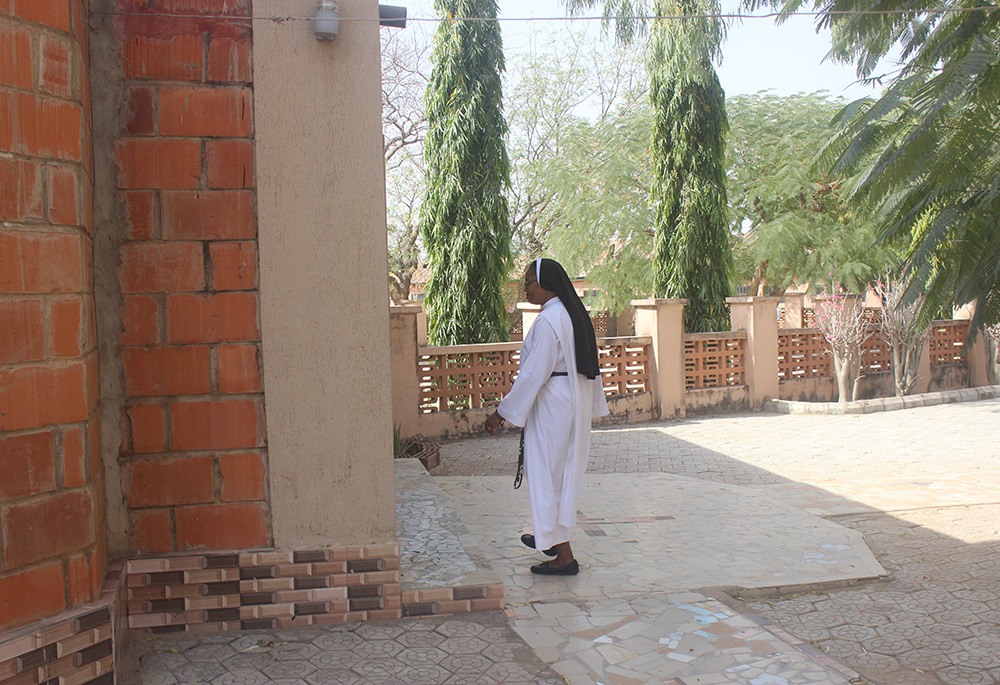
Sr. Justina Nnajiofor, left, and Sr. Chinaza Eze, members of the Dominican Sisters of St. Catherine of Siena, told Global Sisters Report that their faith is unshaken in the face of attacks by bandits in Nigeria. (Patrick Egwu)
Editor's note: Global Sisters Report's new series, Hope Amid Turmoil: Sisters in Conflict Areas, offers a look at the lives and ministries of women religious serving in dangerous places worldwide. The news stories, columns and Q&As in this series will include sisters in Ukraine, Nigeria, Kenya, Sri Lanka, Nicaragua and more throughout 2023.
On a foggy Sunday morning, Sr. Justina Nnajiofor, and other sisters of the Dominican Sisters of St. Catherine of Siena were attending Mass at Our Lady of Fatima Catholic Church in Gusau, a densely populated, Muslim-dominated city in Zamfara state, northwest Nigeria.

The religious community is in the heart of the city which has seen growing cycles of attacks by armed gangs locally known as "bandits" who raid villages, rustle cattle, destroy farmlands and abduct locals for ransom.
"With all these things happening, parishioners are still coming to Mass in large numbers," said Nnajiofor, who is the prioress of the community. "The number [of parishioners] is increasing that sisters from our community would normally help the priest to distribute Communion at Mass."
For the past five years, bandits, mostly driven by greed and quest for dominance, have overrun villages, attacked security posts, abducted locals and killed anyone who defies them or fails to pay ransom for their release. According to The New Humanitarian, in the last three months of 2022, 1,090 abductions were recorded.
In February, 452 incidents that resulted in 173 abductions and 620 fatalities were recorded, according to a report by Beacon Consulting, a security risk management and intelligence firm.
Ransoms paid to the militants by the government and families of victims, is worth millions of dollars each year.
According to the International Federation of Red Cross And Red Crescent Societies, over 453,000 people were displaced in Nigeria's northwest region as of January 2022, while HumAngle reports that more than 70,000 people from northwest Nigeria have fled their homes and communities to neighboring countries for refuge.
The government and an outgunned security personnel have been unable to contain the armed men.
Nnajiofor says that the sisters constantly live in fear due to the growing attacks and heightened insecurity in the region.
"People who live here express shock and fear because of what is currently happening," she said. "They would ask me what I am doing in a place where people are killed or abducted all the time."
Shutting down schools
The religious community has two schools — Dominican College and Fatima Nursery and Primary School, Gusau — which they run as part of their ministry.
The sisters, along with laypeople, teach math, science, arts and social studies at the schools.
In Nigeria, mission schools are preferred to government-run schools. Parents believe schools run by sisters, for example, are better equipped and provide tailor-made instructional materials that help instill moral and ethical values in their children.
"Our standards are high and we make sure that students receive better quality education than what you get elsewhere," Nnajiofor said. "That is why everyone wants to bring their kids to our school because they tend to perform better in national examinations and competitions than students from other schools."

Dominican College and Fatima Nursery and Primary School are owned by the sisters. The schools were closed for several months in 2021 due to insecurity. (Patrick Egwu)
The bandits have turned their attention to schools and colleges, abducting students for ransom from parents or the government.
In February 2021, about 317 schoolgirls were abducted by armed bandits during a raid, according to government and police sources.
This is the largest mass abduction carried out by the gunmen after several pockets of abductions across the state.
This tactic was first used by Boko Haram terrorists in northeast Nigeria after the infamous April 2014 abduction of 276 schoolgirls ages 12 to 17 in Chibok. The incident attracted wide international condemnation from foreign leaders, governments and international organizations.
Since December 2020, more than 1,000 students and pupils have been abducted in dozens of attacks on schools or colleges across Nigeria's northwest region.
When attacks and abductions by the bandits intensified, especially with the abduction of another 73 students in 2021, the government in Zamfara shut down all schools in the state. Last September, more than 600 schools were closed out of fear, disrupting academic activities in the state for several months.
When the ban lingered, some parents, unhappy with the disruption of their children's academics, relocated to schools in a safer region.
Nigeria has more than 18 million out-of-school children, according to UNICEF. The global body said attacks and abductions of students by the gunmen keep more students out of school.
According to a Global Coalition to Protect Education from Attack report, between 2009 and 2018, over 600 teachers were killed, 910 schools damaged or destroyed and more than 1,500 forced to close due to violence.
In January 2022, the government announced it was reopening all schools in the state. Police said they had also increased security around schools to prevent further attacks.
The community sent notices to students to return to school following the lifting of the ban. Some parents, who had changed schools for their children in other regions, brought them back.
Advertisement
'Nowhere in the country is safe now'
In the last decade, the southeastern part of Nigeria has been a relatively peaceful region. Whenever there is security tension in northern Nigeria, people would move east. But this has changed in recent times with growing separatist movements and violent attacks and abductions by enforcers of the movement.
"Nowhere in the country is safe now," Nnajiofor said. "God is the only one who protects and shields us from danger."
Election cycles in Nigeria are usually tense periods. Post-election conflicts have led to violence, destruction of property and assassinations of perceived opponents. This has been largely fueled by political actors and ethnic and religious divisions.
With the growing attacks and heightened insecurity in the country in the wake of the general elections, Nnajiofor said they have resorted to taking precautionary steps to protect themselves and their community.

Zamfara state is a hotbed of violent attacks by armed gangs and militia. The religious community of the Dominican Sisters of St. Catherine of Siena in Gusau, Zamfara, is guarded by two policemen, a private guard and dogs. (Patrick Egwu)
A few months before the general elections, the sisters met the local commissioner of police and asked for more protection and patrol around their community.
The commissioner, a Christian, granted their request and assigned daily security patrols around the community. Nanjiofor said this provided some sense of relief.
The sisters also secured the daily services of two police officers who they pay each month to guard the community.
In addition to the police guard, the sisters also release dogs each night to patrol the vicinity.
However, Nanjiofor said that the strongest weapon the sisters have is prayers.
"We pray every night inside the compound and sprinkle holy water around it," she said. "We put ourselves in God's hands and that has been so helpful."

Sr. Justina Nnajiofor and other sisters in the community always pray inside their compound for God's protection. Nnajiofor is pictured inside, near a picture of Bishop Matthew Hassan Kukah of Sokoto, Nigeria. (Patrick Egwu)
Dealing with trauma
The insecurity in the region has had a toll on the emotional and mental health of the sisters. Specifically, two security incidents close to home have left the sisters in shock and gripped with fear and anxiety.
Last year, a community of the Dominican Sisters in Funtua, a neighboring state of Katsina, was attacked by armed bandits. The gunmen gained entrance into the community, destroyed and looted the belongings of the sisters at the residence.
"These incidents were very traumatic for our sisters living there," Nnajiofor said. "I remember one of the sisters had just arrived two days before the attack happened and it was a shocking experience for her."
Nnajiofor added: "They attacked them but nobody was hurt in the process and we are thankful to God for that. You know it could have been worse if they had touched them."

Sr Justina Nnajiofor walks inside the chapel in their community on March 4. (Patrick Egwu)
In 2021, two priests were abducted by armed men in the neighboring state of Malumfashi. The next day, the body of one of the abducted priests, Alphonsus Bello, was found nearby while the other one was released.
"When these incidents happened, I called the sisters sometimes in the morning and evening to check up on them and know how they are holding up," Nnajiofor said. "It was a traumatic event for them. I also visited them there to see how they were doing."
"We have not really seen a therapist or taken some mental health counseling but it's something we plan to do," she said.
Sometime in 2021, the bandits sent letters to churches and Christian groups in the state to close down and stop worshiping.
The police confirmed the threat letters and said they were working to protect and provide adequate security to Christians in the area.
The sisters continued attending their morning Mass while taking security precautions.

Sr. Justina Nnajiofor says her family is concerned for her safety and always calls to check in on her and other sisters in the community. (Patrick Egwu)
"The police asked us to be cautious and try to end our church programs on time and not allow it to run late into the night," Nnajiofor said. "I told my sisters the same thing to be security conscious. Anytime they don't return to the community early, once I start calling them on the phone to start coming home."
Despite the attacks and the security challenges they face, the sisters run a sewing institute and a bread factory. The sewing institute, managed by Dominican Sr. Felicia Ochube, makes the sisters' habits, soutane for priests and general clothing designs for members of the public.
Nnajiofor said that one of the sisters learned how to make bread and purchased a bread-making machine. The factory makes altar bread and local parishes from within the diocese buy it for their Masses.
Strength of their faith
It was almost 8 a.m at Our Lady's and Dominican Fr. Felix Udolisa was making final announcements to some 800 parishioners before the concluding rites.
Udolisa reminded parishioners that every first Friday of every month at 5 p.m., the parish comes together to pray and say the rosary. The program ends with a benediction.
"You are required to go for confession and to attend Mass on that day," Udolisa announced. "So, I will recommend that every parishioner attends Mass at 6:30 a.m. and the evening procession. We pray that the good Lord will show us his favor through Christ our lord. Amen."
Nnajiofor steps outside and gestures to one of the sisters, Dominican Sr. Chinaza Eze, to get in the car for the 10-minute drive back to their community.
On the drive, Nnajiofor says she is hopeful things will return to normal so people can live without fear of attacks.
"My family is concerned about my safety here," she said. "They normally call me to check up on me. But we are strengthened by the courage shown by our parishioners and members of the community despite the attacks."









